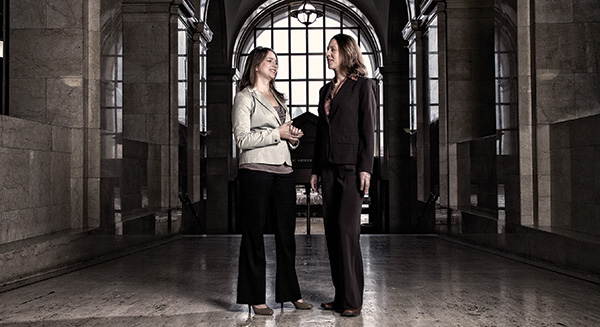
When Milwaukee Mayor Tom Barrett needed a translator to make a meeting with a Basque business delegation go smoothly, Susan Schweigert was there to help.
Video by Chris Baylor
Watch: UWM Translation Alumni Help Fulfill Children’s Wishes (View full size at
http://youtu.be/TJ5HubVnnVc)
Schweigert, who earned her degree from UWM’s growing online graduate program in translation and interpreting two years ago, now runs her own business, Schweigert Language Services. She offers translation of written documents from Spanish, Portuguese and French to English and is certified as a Spanish interpreter in the Wisconsin courts.
Schweigert credits her coursework in her Master of Arts in Language, Literature and Translation (MALLT) program with giving her the business and legal skills she needed to launch her career.
“I liked the idea of the flexibility and variety of having my own business. I’m immensely grateful for what I learned in those courses and in the program,” says Schweigert.
UWM’s online program in Translation and Interpreting Studies (TIS), one of the few in the country, is meeting an increasing demand for interpreters (spoken language) and translators (written), says Lorena Terando, chair of the TIS program, a master’s degree program within the interdepartmental MALLT area.
“Even the United Nations is having trouble finding translation experts,” she says.
Growing with globalization
The increasing globalization of business is a key factor, adding to the demand for programs like UWM’s. The translation and interpreting program has grown from 30 students to more than 50 in just a few short years.
“Japanese companies are expanding their manufacturing operations in Kentucky and Tennessee, and German and Spanish companies are doing a great deal of work in green energy,” says Kate Scholz, senior lecturer and internship coordinator for the TIS program.
With the addition in 2014 of a Russian-to-English track, UWM now offers seven options: Spanish, Japanese, Arabic, French and German to English, and English to Spanish. UWM’s program, one of the few in the U.S. granting a master’s degree in translation, is an institutional member of the American Translators Association (ATA). Because it is totally online, it attracts students from around the U.S. and as far away as Jordan.
Job opportunities for translators/interpreters are expanding, says Terando, and the work is varied.
Recently, for example, a student worked with a Milwaukee-based international company to help auditors translate expense accounts submitted in Russian. Graduates like Schweigert work with the legal system, helping lawyers translate legal documents and interpreting the testimony of Spanish-speaking defendants or witnesses in court. Other graduates work with local health care systems, helping improve communication between medical staff and patients who don’t speak English well.
Beyond language proficiency
Being able to speak a language fluently is a prerequisite for entering the program, but becoming a translator/interpreter involves far more complex knowledge than excellent language skills, says Terando. Students who specialize in areas like legal or medical translation/interpreting have to learn the professional language of those fields as well as the ethics surrounding issues such as handling confidential medical information.
Students also learn the skills needed to do consecutive and simultaneous interpretation. Consecutive interpreting involves listening to a speaker, who then pauses as the interpreter repeats what the speaker said in another language. Good memory skills and attention to details and tone of voice are essential.
Simultaneous interpreting is even more challenging, since there are no long pauses between speaking and interpreting.
“It takes a lot of practice,” says Schweigert. “It’s really intense – listening, connecting what’s being said to your brain, and saying it in another language. It has to become almost automatic, but it can be really exhausting.”
Students can choose either a professional or research track, depending on whether they want to work as translators/interpreters for businesses or organizations, or continue to do research in the field in an academic setting, going on for a Ph.D. The translation program also offers a certificate program as well as a joint degree with the School of Information Studies for students interested in working in libraries or with information systems.
All students also do an internship with an organization, agency or company located in their geographic area or elsewhere. Students, for example, have worked remotely with Kiva.org, a microlending organization in California. Students often also do volunteer work, interpreting at parent-teacher conferences for non-English-speaking parents, for example.
Internships are tied to the students’ specialties. Locally, interns have worked with translation businesses, local clinics and hospitals, at the Marquette Legal Clinic, the Milwaukee County Justice Center, the Milwaukee Public Museum and the Milwaukee Jewish Museum, says Scholz. A student based in Kentucky is doing an internship with a Japanese company that manufactures automotive parts in Bowling Green.
“Those internships and experiences often lead to jobs after graduation, notes Leah Leone, the third full-time faculty member in the program, who heads the Spanish language track.
The program is building an increasing number of partnerships with local businesses and organizations, says Scholz.
“These partnerships are really building awareness of the value of language services and the need for them,” says Terando. “Companies looking to expand outside of North America are awakening to the need to be more language savvy. Today you can’t get along in English only.”






